
China claims its first gold medal of 2022 Olympics

China claims first gold medal at Winter Olympics
From CNN’s Homero DeLaFuente
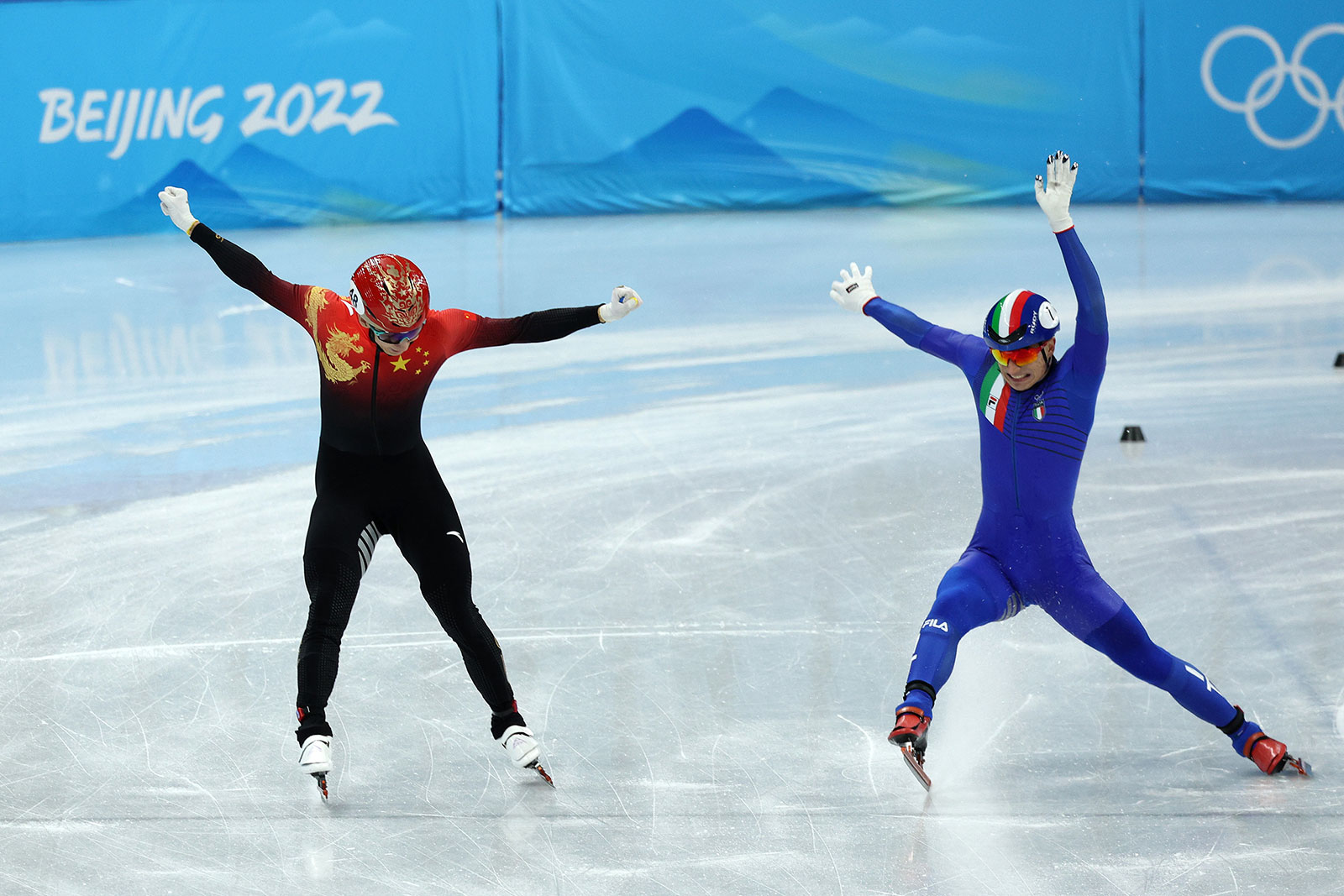
China claimed its first gold medal of the 2022 Beijing Winter Olympics, after placing first in the short track mixed relay speed skating event on Saturday.
The host nation narrowly beat out second-place Italy by 0.016 seconds to claim their first-ever short track mixed relay gold, to a huge roar of the crowd.
China finished with a time of 2:37.348, while Italy notched a time of 2:37.364 for second place. Hungary came in third with a time of 2:40.900.
Monobob? Meet the 7 new Olympic events
From CNN’s Jason Kurtz
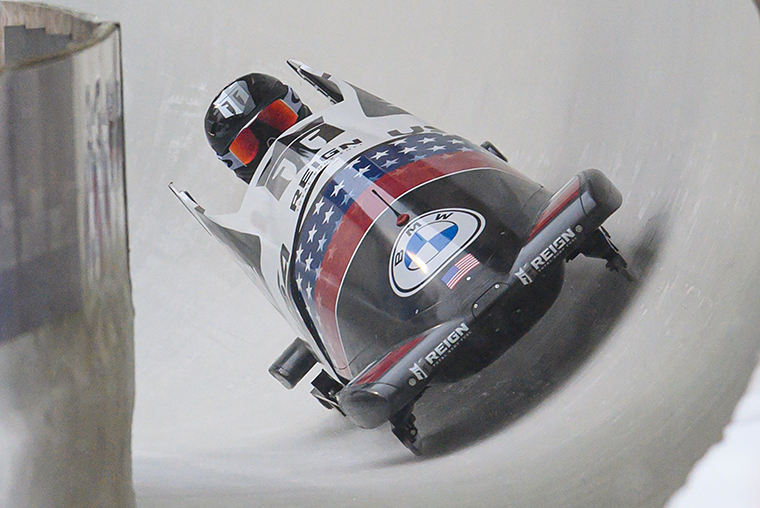
The 2022 Olympic Games are underway from Beijing, China, and along with the international pageantry also comes the traditional events fans have grown to know and love; hockey, curling, and figure skating, to name a few.
However, this year’s games will introduce the world to seven brand-new events.
Here they are, along with some details on each:
Women’s monobob
As the name suggests, this event features a single, female participant tasked with quickly navigating a sled down the windy, icy track all by her lonesome.
The event joins the pre-existing, traditional bobsled events: four-man, two-man, and two-woman. As such, the Beijing Games mark the first time female bobsledders have had two medal opportunities, bringing them even with men.
In the women’s monobob event, each competitor’s sled is identical, removing any potential design advantages.
Men and women’s big air skiing (two separate events)
For the true daredevils out there, freeskiers will take to the Beijing air in an event dedicated to wowing the crowd — and the judges — with their most creative, challenging, heart-in-your-throat tricks. In events for both men and women, Olympic competitors launch themselves off of a ramp, aiming to execute a single, impressive trick on each run before landing cleanly.
The skiers begin atop a run that stands 50 meters high, and will be judged on five factors:
- difficulty
- execution
- amplitude
- landing
- progression
In the Olympic final, competitors will make three runs, with their overall score coming from the two best attempts.
The max score for each run is 100 points.
Mixed team relay in short-track speedskating
Think of a lightning-quick, coed, relay race. Now put it on ice. That’s essentially what this new speedskating event is, as teams of four (two men and two women) race one another over the course of 2,000 meters (18 laps).
The Olympics have already featured a men’s (5,000 meters) and a women’s (3,000 meters) speedskating relay; this year’s Games, however, will be the first time a mixed-gender event is offered.
The competition begins with each female skater racing for two-and-a-half laps, followed by each male skater covering the same distance. That brings us to 10 laps. The teams’ female skaters go again, each for two laps. Now we’re at 14. Finally, each teams’ male skaters sprint it out for two laps apiece, bringing the total laps covered to 18.
The first team to the finish wins, with medal positions expected to be decided by mere fractions of seconds.
Mixed team ski jumping
It began with men’s ski jumping, back in 1988.
Women ski jumpers joined the fun 20 years later at the 2018 Olympic Games.
Now a third medal-earning opportunity has been added to the discipline, as teams of four — two men, two women — compete on ski jumps that feature a 98-meter takeoff.
The event follows a woman-man-woman-man format, with the athletes being individually judged on elements including style and distance. Each skier’s score is added up to produce the team total. Look. Out. Below.
Mixed team snowboard cross
In a modern-day version of “last one to the bottom is a rotten egg,” this event features teams of two, one woman, one man, racing from a starting gate atop a mountain, to the finish line down below.
It’s pure speed, with various obstacles and tests of aptitude — drops, turns, jumps — sprinkled in throughout the course.
The man begins, and only when he reaches the bottom can the starting gate re-open, allowing his female teammate to begin her descent. The team whose woman reaches the finishes line fastest earns victory and is thus, most certainly, NOT a rotten egg.
Mixed team aerial freestyle skiing
Never before has aerial freestyle skiing been a team event. That all changes this year in Beijing, as teams of three combine forces to reach new heights and land upon the medal stand.
Athletes propel off a jump and soar into the sky, where they will engage in a collection of twists and turns, flips and spins, before ultimately, and hopefully, sticking the landing at the slope’s bottom.
Each three-person team must have at least one male and one female, and the combined marks of the skiers will produce the team’s total score.
Norway wins second gold medal of the Games
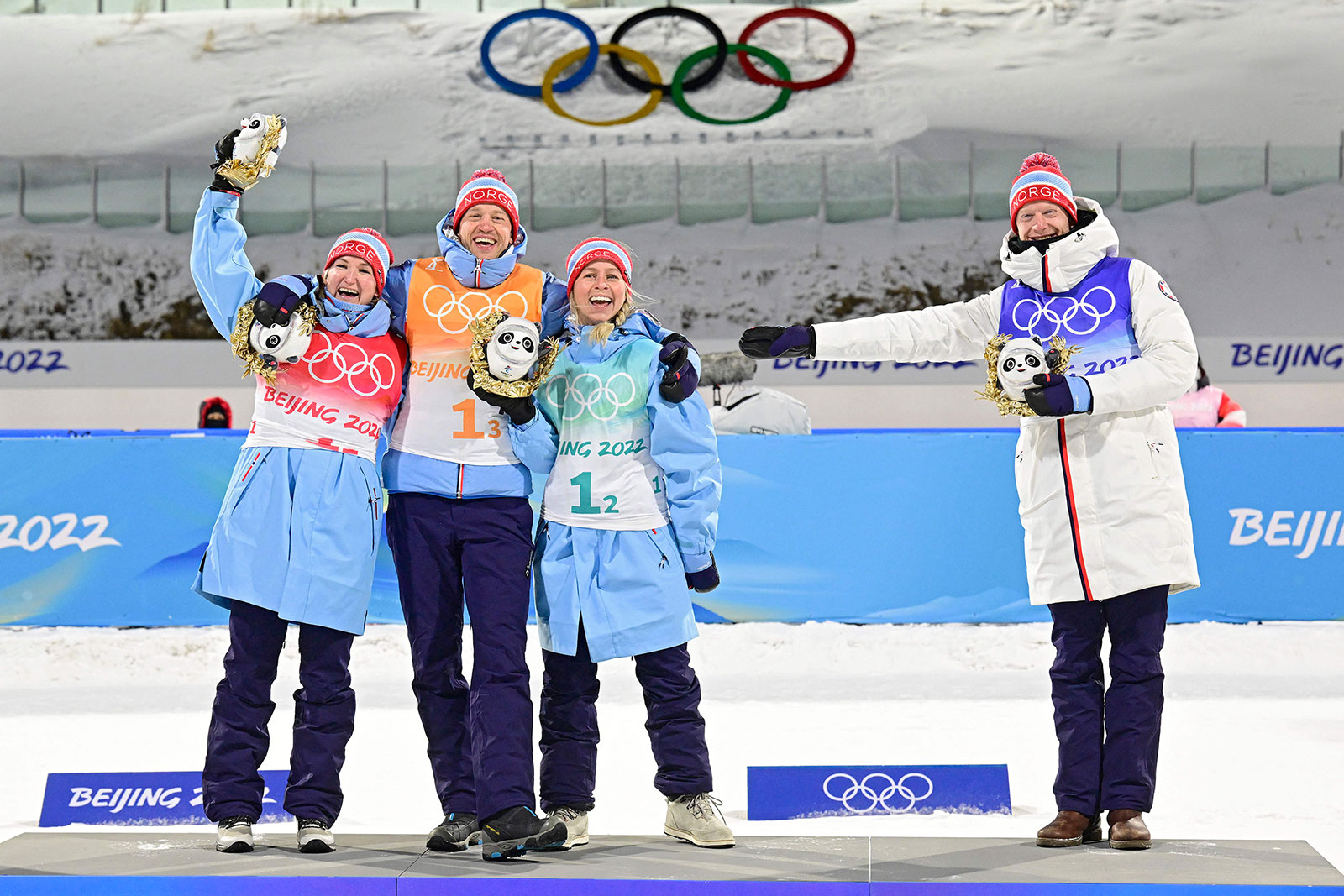
Norway has clinched its second gold medal in the Games so far, this time in the biathlon mixed relay 4x6km.
Marte Olsbu Roeiseland, Tiril Eckhoff, Tarjei Boe and Johannes Thingnes Boe took the gold medal with a time of 1:06:45.6, according to the official Olympics site.
It was the first Olympic gold for Roeiseland, who told reporters she was “super happy” with the result.
Eckhoff added:
“It was an amazing relay. It was so much up and down, and I had a really tough leg, but I had amazing teammates who made it possible. I don’t know about you guys, but I think this was one of the relays with the most excitement ever, so it was very fun for us,” she said.
When asked if he thought he could close a gap in the final meters, Boe said: “I saw early I gained some seconds, and then I believed I can catch them.”
“With the two-kilometer course here, I knew it was going to end up a sprint and I’ve been prepared since I came here on Monday. I trained what to do and did my best performance and my preparation for last week, I already did it in my head 100 times,” he added.
The Norwegian team is the reigning world champion in this event, according to the Olympics website.
Medal winning athletes at Beijing 2022 get to take home panda souvenir
From CNN’s Nectar Gan in Beijing
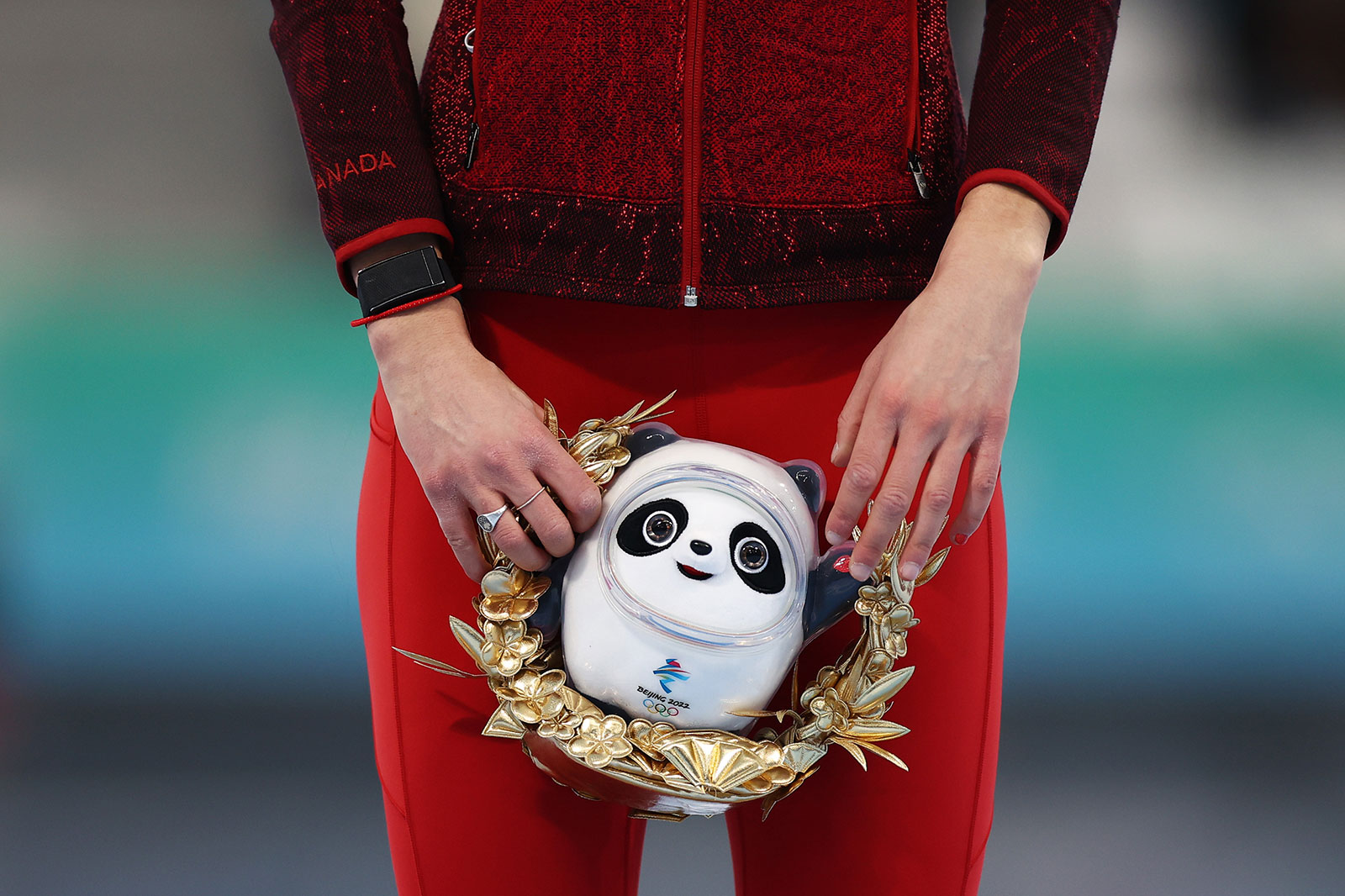
Athletes that make the podium in Beijing will have more than just a medal to take home.
All medal-winning athletes will receive a special souvenir for their achievements — featuring panda mascot Bing Dwen Dwen and a golden garland of pine, bamboo and plum flower, a traditional Chinese art motif known as the “three friends of winter.”
The trio is known as such because they do not wither in winter, embodying “steadfastness, perseverance, and resilience.”
According to the official Olympic website, “Bing” has several meanings in Mandarin Chinese, though the most common is ice. The word also symbolises purity and strength.
“Dwen Dwen” means robust and lively, and also represents children.
The Bing Dwen Dwen design — created by Cao Xue — was chosen from over 5,800 submissions from China and 35 countries around the world as part of a global competition arranged by the Beijing 2022 Organising Committee, added the official Olympic website.
Dutch speed skater aiming for gold after suffering severe burns in wood-burning stove accident
From CNN’s Jack Bantock
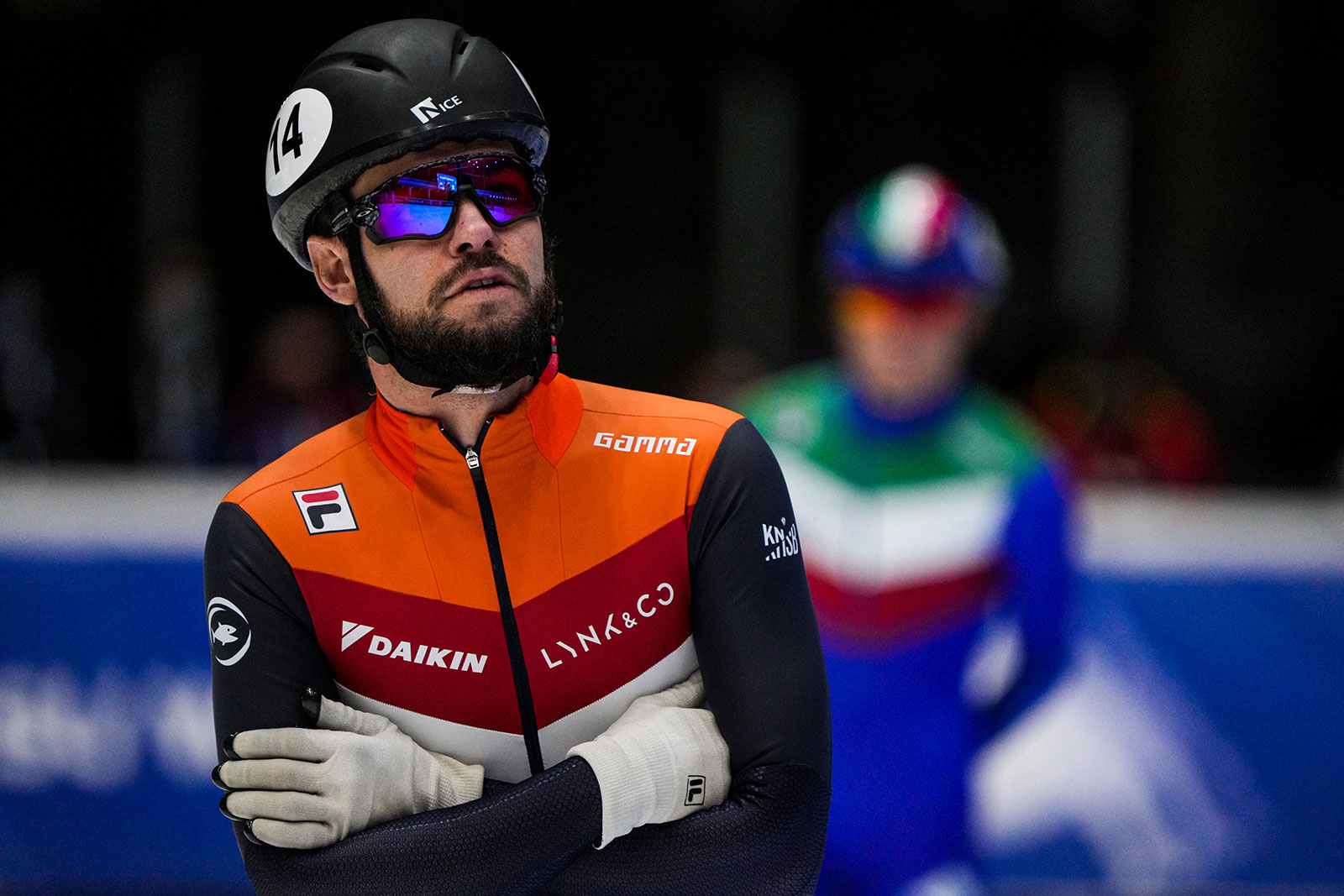
Dutch speed skater Sjinkie Knegt competes on Saturday at Beijing 2022, yet the fact he is taking part at the Winter Olympics is an achievement in itself.
The 32-year-old was hospitalized with severe burns for seven weeks after burning wood fell onto a bottle of thinner which exploded as he lit the wood-burning stove at his home in January 2019.
Knegt suffered burns to his face, chest, legs and feet after his clothes caught fire, with his recovery complicated by a leg injury he had sustained a month prior following a forklift truck accident.
His story was the subject of “Sjinkie: Playing with Fire,” a documentary by Dutch broadcaster NOS.
“I knew the images were there, but they really shocked me,” said Knegt, who admitted that he found the program difficult to watch.
“The first time I saw it, it was hard to swallow. Knowing that I made it this far after all that, is something I can only be proud of.
“I sometimes downplayed it all and spoke about it as if everything would be alright, but when I heard the doctors speak about it in the documentary, it was pretty heavy to take,” added Knegt.
The 2015 short track speed skating world champion watched the documentary “four, five times” before it was officially released.
Since the documentary aired, Knegt has received plenty of supportive responses, which have helped motivate him following his return to competition in February 2020.
Claiming silver in the 1500m at the Dordrecht World Cup event in November 2021 was another “a nice boost” for Knegt.
“It was such a relief … after all I have been through,” said the 32-year-old skater as he reflected on being selected for his fourth Games.
“I’m prouder than ever, and I am super happy to be able to compete for the medals again.”
Knegt kicks off his Beijing journey in the mixed team relay at the Capital Indoor Stadium on Saturday, his first of four chances at a medal at the Games.
“Of course, I would love to win a medal individually, but if I win one with the relay I would be more than happy too,” said Knegt, who won bronze at Sochi in 2014 and silver at PyeongChang four years later.
“Although I prefer the gold, I’m happy to win a medal of any color.”
Dutch speed skater Schouten wins women’s 3000m gold in Olympic record time
From CNN’s Angus Watson and Jack Bantock
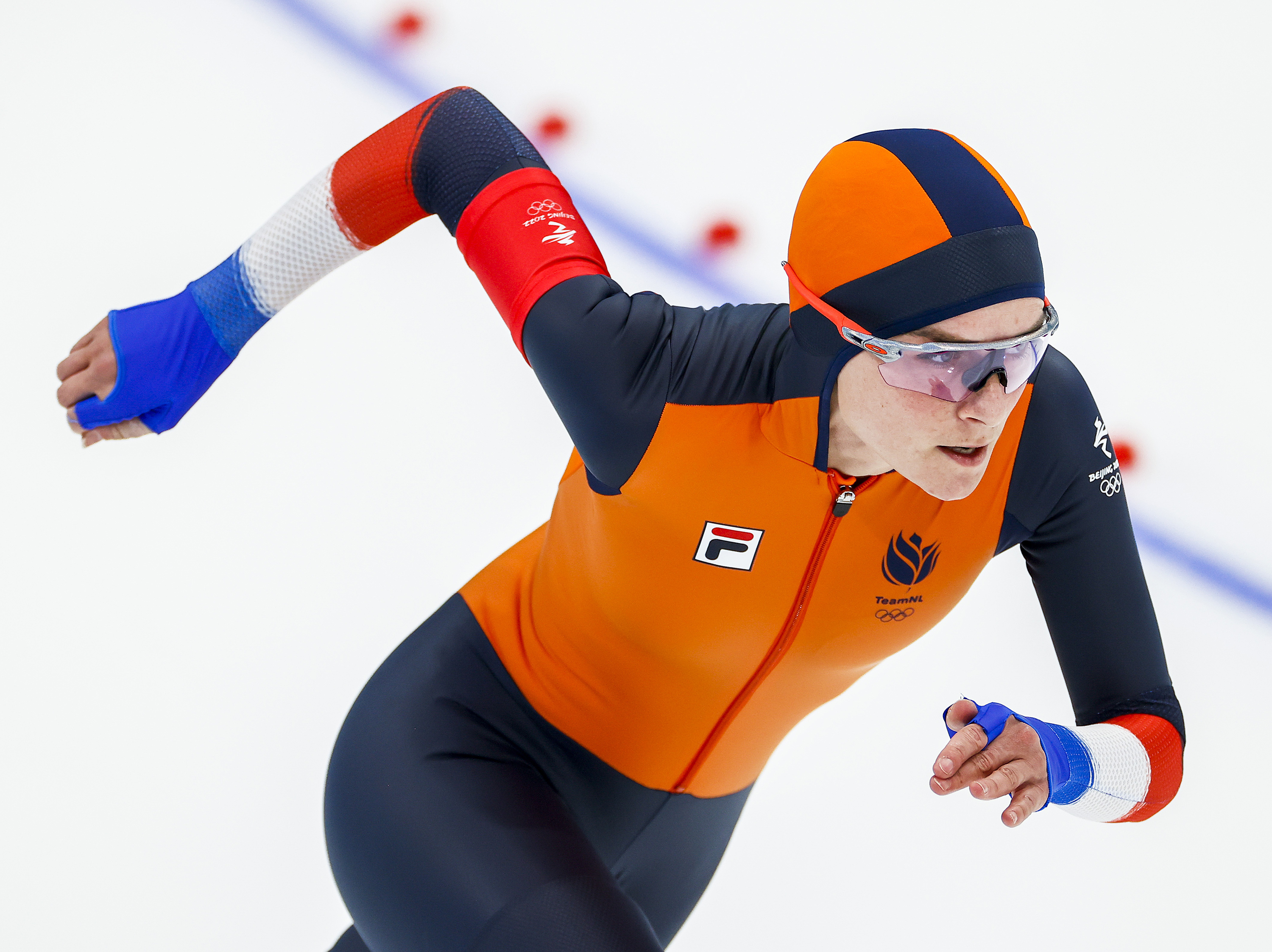
Irene Schouten of the Netherlands set a new Olympic record en route to gold in the women’s 3000m speed skating event.
Schouten pipped Italy’s Francesca Lollobrigida in a thrilling race to win with a new Olympic record time of 3:56.93.
Isabelle Weidemann took bronze to round out the podium, securing Canada’s 200th Winter Olympics medal.
“There was a lot of pressure for myself and for the Netherlands and I’m so happy I made it,” said Schouten.
“I was in the last pair and you see all the girls race in front of you, and they raced really fast.
“Four years ago I did not qualify, so I wanted this one. When I was young I had a big dream to win Olympic gold and now I have it.”
Schouten’s blistering time topped a 20-year-old existing Olympic record set at the 2002 Games in Salt Lake City.
That year, the gold medal was won by Germany’s Claudia Pechstein. Two decades later in Beijing, Pechstein competed in the race that saw the record change hands — finishing 20th in a time of 04:17.16.
Oldest competitor in Beijing: Claudia Pechstein, 49, competes at record eighth Games
From CNN’s Angus Watson and Ben Church
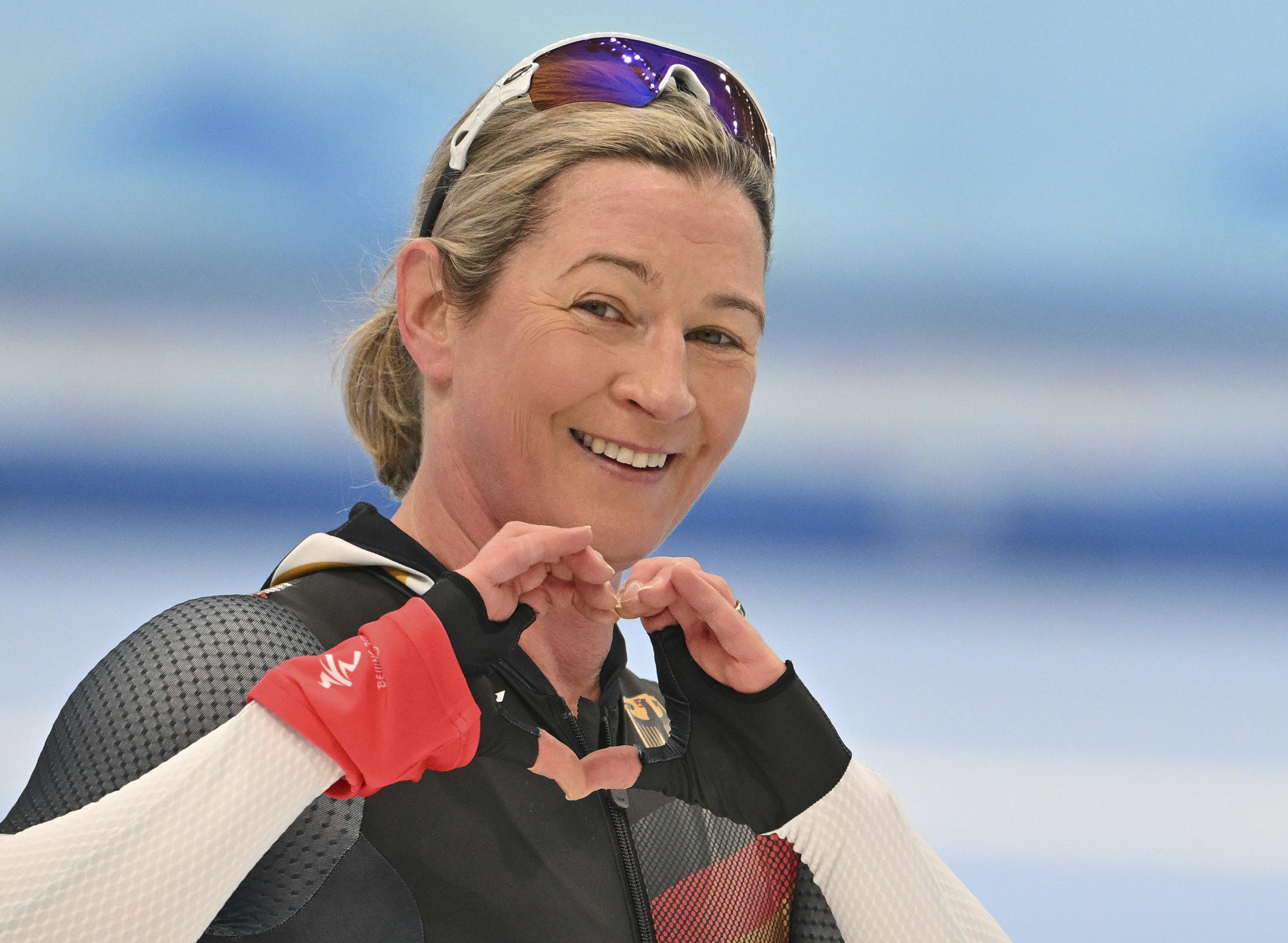
German speed skater Claudia Pechstein is the oldest competitor — male or female — in Beijing this month.
And after competing in the women’s 3000m gold medal race on Saturday, the 49-year-old Pechstein now shares the record for most Winter Olympic appearances with legendary Japanese skier Noriaki Kasai having already competed in seven previous Games.
Pechstein’s first Winter Games came in Albertville, France in 1992.
The 49-year-old, who was a flagbearer for Team Germany at Friday’s Opening Ceremony, has a wealth of experience on her side and has won nine Olympic medals during her lengthy and controversial career, including five gold medals.
READ: The youngest and oldest Winter Olympians competing at Beijing 2022
Pechstein was given a two-year doping ban after she returned irregular tests in 2009 but has consistently denied taking performance enhancing drugs — the Court of Arbitration for Sport confirmed her suspension.
She may not be at her peak anymore, but an eighth Winter Games is something to note and no other woman has managed the feat.
Pechstein finished last in Saturday’s gold medal race, but she celebrated with a double fist pump and smile.
“I was not too fast, but I smiled because today I got my goal to race in my eighth Olympic Games. This was important for me,” said Pechstein.
“Yesterday I carried the flag. It was an amazing moment, a top moment in my career.
“The result of today was not so important, it was just to race and to be here. I am super proud.”
South Korea angry over ‘stealing of culture’ during Beijing 2022 Opening Ceremony
From CNN’s Jake Kwon in Seoul
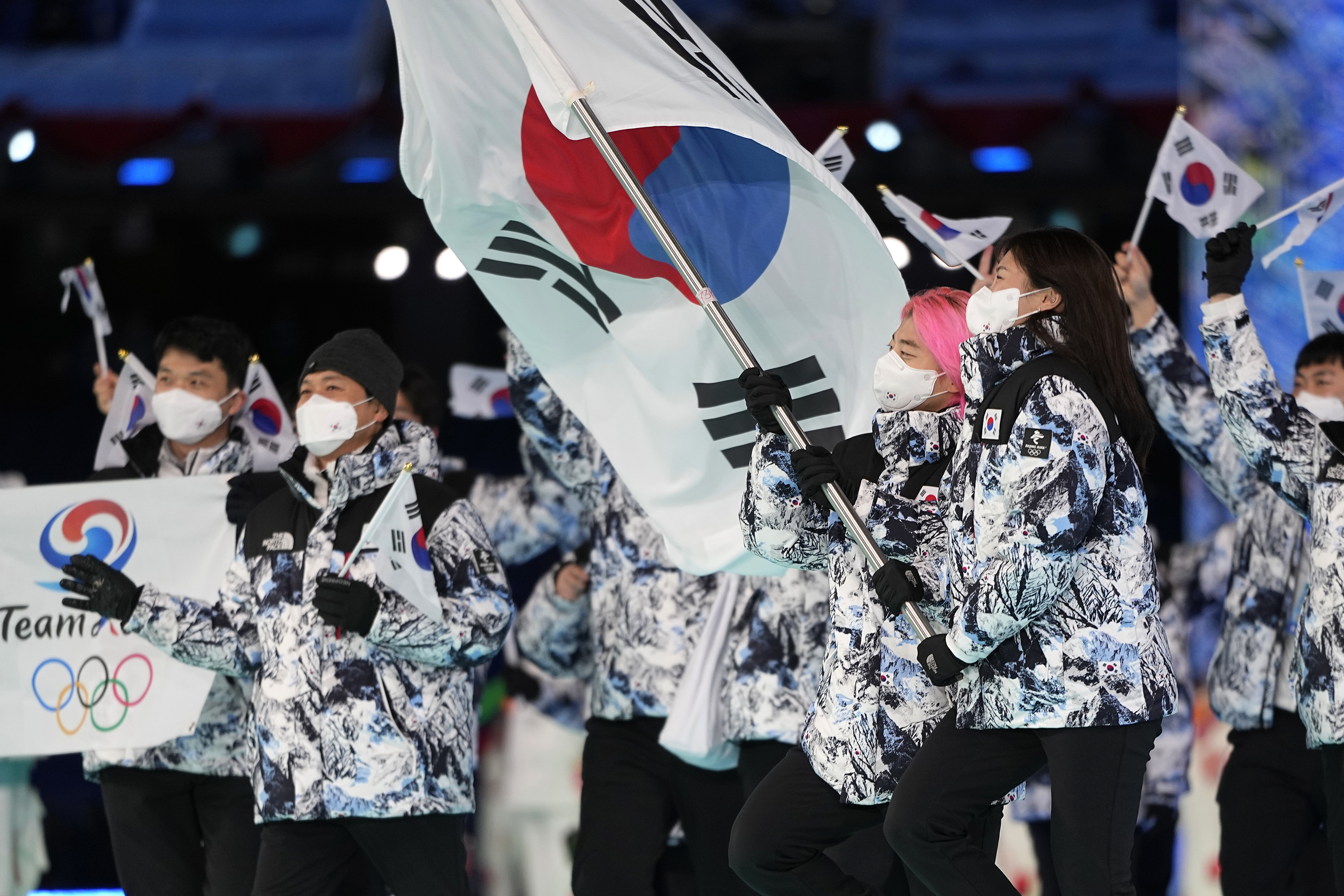
South Korea’s political parties have accused China of cultural appropriation after a woman appeared to be wearing a traditional Korean dress during the Opening Ceremony.
South Koreans have long been irked by what they deem to be China passing off South Korean culture as their own, including the traditional Korean dress called the hanbok.
Koreans are one of China’s 56 officially recognized ethnic groups.
South Korea’s ruling Democratic Party released a statement on Saturday criticizing China and demanding it stops “stealing” its “culture.”
“China has been using its Korean ethnic minority since June 2001 to appropriate the history of the North East region (where Korea traces its roots),” it read.
“China’s brazen stealing of culture at a time like the Olympic Games which draws the world’s attention cannot be ignored.
“We express deep regret that China showed Korean traditional dress as Chinese traditional dress at the Beijing Olympic Games and we demand that China stop the stealing of culture.”
South Korea’s main opposition party, the People’s Power Party, also released a statement which read: “How soft (China) must think South Korea is to flagrantly display cultural stealing at the Opening Ceremony of the Olympics where the world is watching.
Adding: “The government must lodge a clear protest and receive an apology and a guarantee that it won’t be repeated.”
Artist Ai Weiwei helped create the iconic Bird’s Nest stadium in Beijing. He now regrets how it’s being used
From CNN’s Jacqui Palumbo and Christiane Amanpour
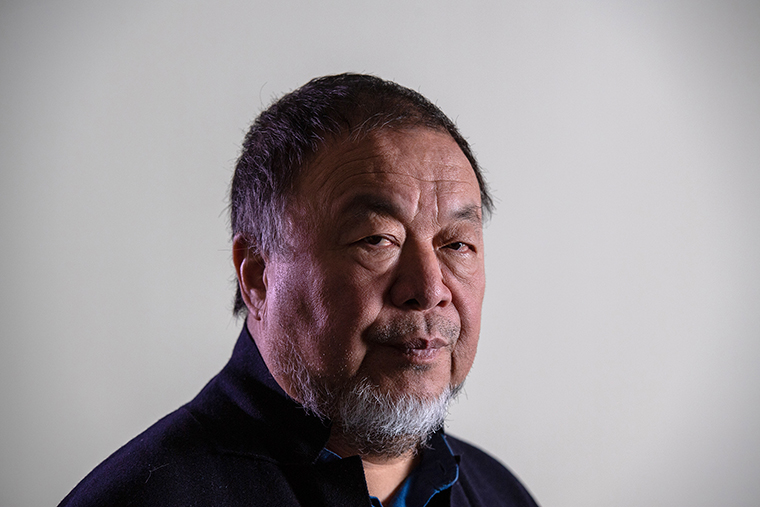
As the Beijing Winter Olympics get underway, artist Ai Weiwei is once again criticizing China’s ruling Communist Party — and the International Olympic Committee (IOC), which he said is “ignoring” the safety of the country’s athletes by prioritizing business and “standing next to the authoritarians.”
Dissident in exile: The world-renowned Chinese dissident and rights activist made the comments to CNN’s Christiane Amanpour in an interview from Portugal, where he has been living in self-exile since 2021.
Fearing for his safety were he to return to China, where he was once detained for 81 days for “inciting the subversion of state power,” Ai has resided around Europe for almost seven years.
Beijing’s iconic stadium: Years prior to his departure from his home country, Ai famously consulted on the design of the venue hosting Friday night’s Opening Ceremony: the Beijing National Stadium, or “Bird’s Nest.”
But the artist distanced himself from the project and criticized China’s hosting of the Olympics ahead of the Opening Ceremony, believing it to be a propaganda tool at odds with what he felt were the oppressive realities of life in the country.
“Unfortunately, as an architect, you cannot control how the building is being used,” Ai told CNN in an interview. “For me, it’s a big disappointment, not only in how it’s being used but also in the directions China (has taken) in past decades.”
Read the full story here.
Source: https://www.cnn.com/world/live-news/beijing-winter-olympics-02-05-22-spt-intl-hnk/index.html


















